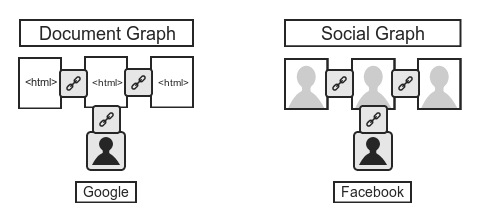Last year, Bloomberg reported that Google, which has the market share of over 65% in search, made a $54 billion impact on US economic activity. For every $1 a company spent on search related advertising, they receive an average of $8 through profits through Google Search and AdWords. Google created a platform where businesses optimized their web presence, thus increasing monetization.
Google supplied the two necessary ingredients for a successful platform (a) Monetization and (b) Users. Rest was left to the developers to figure out as to how to connect the dots and monetize. A lot of startups were built assuming Google’s existence in mind. Entrepreneurs started developing on Google–the platform.
Things have changed in last year, with facebook becoming the destination of choice. What Google lacked as a platform, Facebook has provided a set of tools and APIs to allow developers to build on it.
On the other hand, a lot of people are calling facebook a closed platform, but if they look deeper, Facebook’s set of tools and API is the connecting link to the outside world. Facebook Connect (which has 100m+ websites using it) and the Open Graph are the window to the outside world. The former connects a facebook user to a website, whereas the latter brings the data residing outside into facebook. Combined together, this gives facebook a full-duplex connectivity with “objects” which are not within the facebook ecosystem.
As facebook accelerates the opening of the proverbial “walled garden” via even better tools & it’s API, the pace of development would also increase.
Let’s compare the google vs. facebook ecosystem. Google monetizes it’s document graph while facebook on top of social graph.

Google builds on the fact that a user encodes it’s behavior by creating documents (or webpages). For example, a personal blog post has an author’s stream of consciousness encoded in it. When Coca-cola creates a webpage, the brand and it’s product intentions are encoded in an HTML document. Google then deduces the intent and the interlinked behavior and churns everything through it’s algorithm for search, discovery and monetization using it’s advertising programs. Compare this with facebook, these encodings are verbatim; relationships are threadbare. Furthermore, the intent & relationships are identifiable via the explicit intentions laid out by people connected to it. While Google monetizes the various nuggets of implied behavior, facebook does the same via harnessing the collective force of explicit intentions.
Why build on facebook? I strongly believe that as the web becomes increasingly complex, the findability of a document becomes next to impossible, we’ll go back where we started–Our personal network. The network of trusted friends and advisors for help; whether we are looking for answers to questions, recommendations for products, or simply connecting with strangers. We’ll traverse through our social graph and use the intent of the graph to get the results for our queries.
Facebook is emerging as a platform beyond intent (ad networks, lead generation) and casual interaction (social gaming, virtual gifting) but also a serious destination for tangible-goods commerce, content discovery and business to business interactions.
If you look at advertising, facebook could corner a large pie of the $140 billion brand advertising market. Compared to Google, I don’t have to search on facebook to see an ad, nor facebook has to harvest my clickstream, the sheer presence and precise demographic data and my conscious stream makes an impression commanding much higher CPMs compared to other real-estate. Search advertising on which Google builds it overall revenue of $10billion annually is just overall $25 billion worldwide. I can speculate that a portion of this would also move into the facebook ecosystem as tools for discovery and search start showing within the facebook ecosystem. The latter could add to facebook’s share of performance advertising.
Virtual and tangible-goods commerce are still under evolution. Though, facebook credits do not bring a huge windfall yet, Facebook is working on a paypal-like competitive offering which may be extended to the apps ecosystem. This is going to revv-up the revenue from non-advertising sources. Couple this with local deals from facebook places, which is still building momentum.
In case of facebook, the precision of explicit intentions is high compared to implied behaviors from reams of webpages. There is a huge possibility that facebook’s impact on the economy to be 10x than that of Google as facebook is also a destination rather than a powerful traffic cop. The space to watch is the discovery and commerce within the facebook ecosystem. There are unexpected opportunities being presented to developers and entrepreneurs to develop applications beyond gaming and now is the time to get-in!